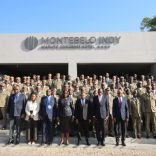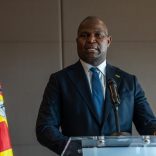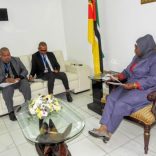Mozambique: Prime Minister calls for respect for human rights in prisons
Mozambique: Growing Blue conference commits to responsible use of oceans

Photo: Ministério do Mar, Águas Interiores e Pescas
Participants at the “Crescendo Azul” (“Growing Blue”) international conference have committed themselves to promote good practices for a sustainable blue economy.
The conference, which was held over two days in the coastal resort of Vilankulo, in the southern Mozambican province of Inhambane, took place in a hybrid format due to the continuing restrictions caused by the Covid-19 global pandemic. Roughly 1,500 delegates from around the world attended in person and virtually, including academics, politicians, representatives of governments and states, and non-governmental organisations.
The event, held under the theme “Sustainable and Shared Governance of the Sea”, was opened on 23 November by Mozambican President Filipe Nyusi, who stated, “in organising this international conference that we call ‘Growing Blue’, we are doing so not just as a platform for dialogue, through which we are joining the global movement, but also to express the desire, together with our neighbours in the western Indian Ocean region, to contribute to an ever better future for our planet”.
The participants took part in intense debates regarding the future sustainability and governance of the oceans, scientific innovations, ocean routes, and energy. In particular, discussions of a technical-scientific nature were held within the context of the lives of the local communities who hold an essential role in protecting the health of the oceans and their marine aquatic ecosystems.
In her speech at the event’s closing ceremony, the Mozambican Minister of the Sea, Inland Waters and Fisheries, Augusta Maita, said that the conference showed, through the high quality of the debates, that it had joined the other world platforms that have seriously discussed the issues faced by oceans.
She continued, “it is with great pride and joy that after two days of interactive work between the participants from different countries and organisations we can see that our expectations have been surpassed”.
Maita pointed out that, through this large event, Mozambique has actively contributed to the search for solutions to the problems faced by the oceans such as illegal fishing, plastic waste deposited in the sea, pollution, and other evils that threaten the preservation and conservation of the ecosystems.
She concluded that the commitments made by everyone at the conference will contribute to the achievement of the Sustainable Development Goals through the blue economy.
The conference ended with a promise to hold the third Crescendo Azul conference next year (the first conference was held in 2019). This will be in alignment with a conference to be held in June next year by the United Nations in Lisbon, Portugal, which will support the implementation of UN Sustainable Development Goal 14: “Conserve and sustainably use the oceans, seas and marine resources for sustainable development”. That conference will be convened jointly by Portugal and Kenya.
Mozambique has a coastline that extends for 2,700 kilometres and contains vital ecosystems such as mangrove forests which play a critical role in preventing coastal erosion and providing a habitat that acts as a nursery for many marine species. Over sixty per cent of the country’s population live in coastal areas, and with many of these relying on the ocean for their livelihood it is essential that they play the role of guardians of nature.
For this reason, Mozambique’s government is drawing up a national strategy for the development of the blue economy, which is due to be completed in December. This will cover fishing and aquaculture, the extractive industries, the hydrocarbon sector, and tourism, and will cover the country’s objectives up until 2030. It will also provide the framework for the regional integrated plan for maritime security.













Leave a Reply
Be the First to Comment!
You must be logged in to post a comment.
You must be logged in to post a comment.